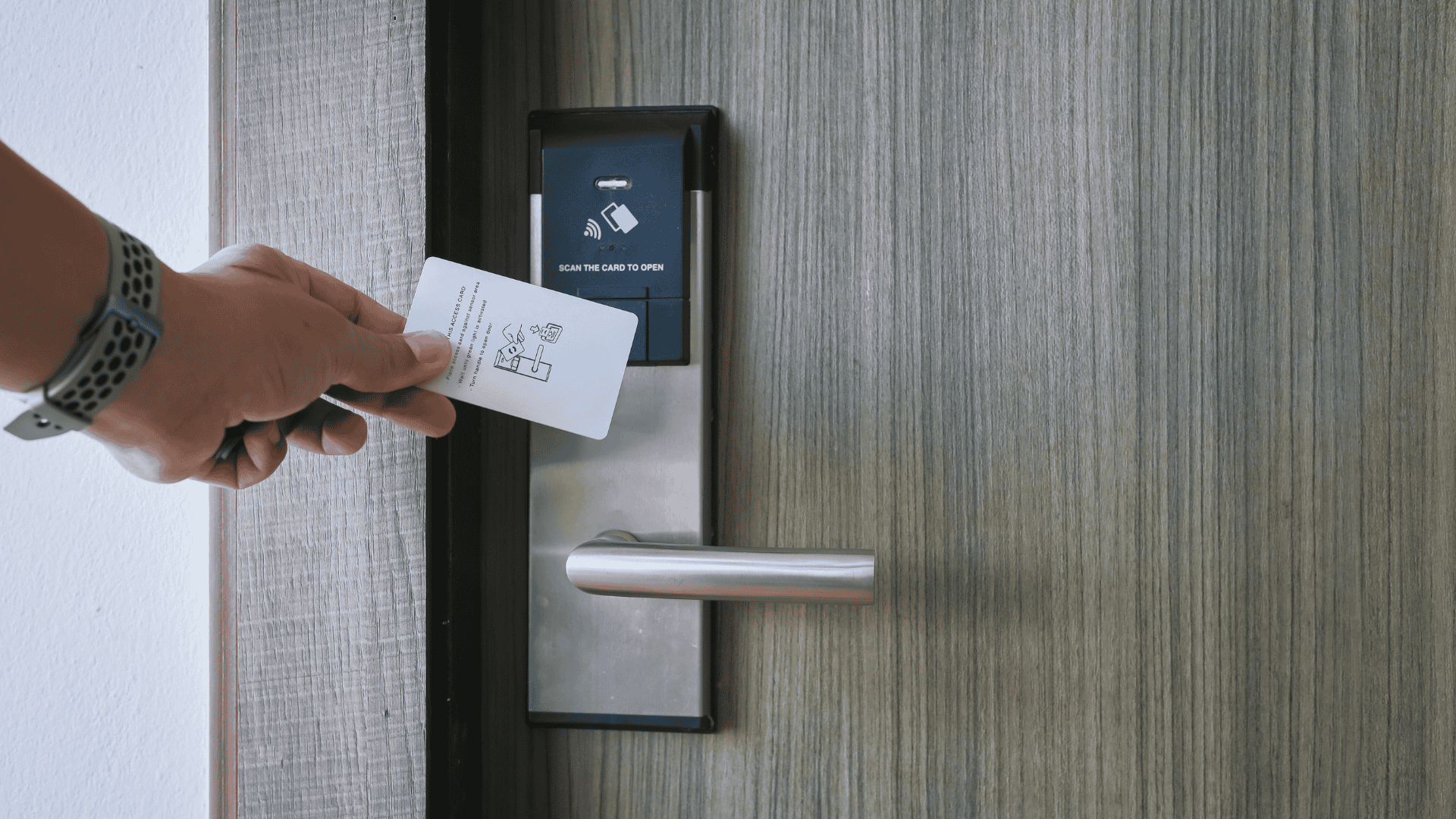As the hospitality industry becomes increasingly reliant on technology, the importance of cybersecurity cannot be overstated.
With online reservation systems, payment processing, and in-room amenities all relying on technology, hotels and resorts have become prime targets for cyber attacks.
A successful cyber attack can lead to financial losses, damage to reputation, and loss of customer trust.
In this article, we will explore the most common cyber threats facing the hospitality industry and provide tips on how hotels can become less vulnerable targets for hackers.
We will also discuss the role of cybersecurity awareness for hoteliers and take a look at what the future of hotel cyber attacks might look like.

The impact of a cyber hack on hotels:
The impact of a cyber attack on a hotel can be significant.
Financial losses can be substantial, as hackers may gain access to sensitive financial data such as credit card numbers and bank account information. In addition to financial losses, a cyber attack can also result in damage to a hotel’s reputation and loss of customer trust.
If a hotel’s systems are compromised, guests may be unable to make or modify reservations, and the hotel may be unable to process payment transactions.
This can lead to frustrated guests and a significant drop in revenue.
In some cases, a cyber attack can also disrupt the day-to-day operations of a hotel, leading to additional costs and inconveniencing guests.
Overall, the impact of a cyber attack on a hotel can be far-reaching and long-lasting.
There have been several high-profile cyber attacks on hotels in recent years. Here are a few examples:
The Mandarin Oriental hotel in Bangkok (2014)
The hotel was the victim of a cyber attack that resulted in the theft of over 500,000 credit card numbers. The hackers accessed the hotel’s point-of-sale systems and were able to steal the credit card information of guests who had made purchases at the hotel’s restaurants and shops.
The Trump Hotels (2017)
The chain suffered data breaches that affected 14 properties in the United States. The hackers gained access to the hotels’ payment systems and were able to steal credit card information from guests who had made purchases at the hotels.
The Mariott International hotel (2018)
They were the victim of a massive data breach that affected up to 500 million guests. The hackers accessed the hotel’s reservation system and were able to steal sensitive information such as names, addresses, and passport numbers.
InterContinental Hotels Group (2019)
The group suffered data breaches that affected guests at 12 of its hotel brands. The hackers gained access to the hotels’ payment systems and were able to steal credit card information from guests who had made purchases at the hotels.
Small hotel in the United States (2019)
The hotel suffered a data breach that resulted in the theft of credit card numbers and other sensitive information. The hackers gained access to the hotel’s payment systems and were able to steal the data of guests who had made purchases at the hotel.
Boutique hotel in Canada (2020)
There were the victim of a phishing attack. Hackers sent fake emails purporting to be from the hotel’s booking system and tricked employees into revealing login credentials. Once they had the login credentials, the hackers were able to access the hotel’s systems and steal sensitive data.
These are just a few examples of the many cyber attacks that have occurred in the hospitality industry. It is important for hotels to be vigilant and take steps to protect themselves and their guests from cyber threats.
Most common cyber threats:
There are several common cyber threats that hotels should be aware of. These include:
- Ransomware: This type of attack involves hackers encrypting hotel data and demanding a ransom in exchange for the decryption key.-
- Phishing: This type of attack involves hackers sending fake emails or texts that appear to be from legitimate sources in order to trick individuals into revealing sensitive information or downloading malware.
- Malware: This type of attack involves hackers installing malicious software on a hotel’s systems in order to gain access to sensitive hotel data or disrupt operations.
- Man-in-the-middle attacks: This type of attack involves hackers intercepting communication between two parties in order to gain access to sensitive information.
- Denial of service (DoS) attacks: This type of attack involves hackers overwhelming a hotel’s systems with traffic, rendering them unable to function properly.
- Password attacks: This type of attack involves hackers attempting to guess or crack passwords in order to gain access to sensitive guest data.
It is important for hotels to be aware of these threats and take steps to protect themselves and their guests from cyber attacks. This can include implementing strong passwords, regularly updating software and security systems, and educating employees on how to identify and prevent cyber attacks.

How a hacker might gain access (example):
Here is a hypothetical example of how a hacker might gain access to a hotel’s systems:
- The hacker sends a phishing email to a hotel employee purporting to be from the hotel’s IT department. The email asks the employee to click on a link to update their login credentials.
- The employee clicks on the link and is redirected to a fake login page where they enter their username and password.
- The hacker now has the employee’s login credentials and can access the hotel’s systems.
- Once inside the hotel’s systems, the hacker can explore the network and look for vulnerabilities to exploit.
- The hacker finds that the hotel is using outdated software and decides to install malware on the system.
- The malware allows the hacker to access sensitive data such as credit card numbers and bank account information.
- The hacker uses this information to commit financial fraud or sells it to other parties on the dark web.
It is important for hotels to be vigilant in protecting their systems and educating their employees on how to identify and prevent cyber attacks. This can help to prevent incidents like the one described above.

Most vulnerable places in a hotel:
There are several areas of a hotel that are particularly vulnerable to cyber attacks. These include:
Wi-Fi networks:
Public Wi-Fi networks are often unsecured and can be easily accessed by hackers.
(See more: best practices and most common Wi-Fi mistakes)
Point-of-sale systems:
These systems, which are used to process payment transactions, are a common target for hackers.
Online reservation systems:
These systems are often the first point of contact for guests and can be vulnerable to attacks.
In-room amenities:
Smart TVs, thermostats, and other connected devices can be vulnerable to hacking if they are not properly secured.
Employee devices:
Hackers may attempt to gain access to a hotel’s systems through employee devices such as laptops and smartphones.
Physical access points:
Hackers may also attempt to gain physical access to a hotel’s systems through unsecured doors or windows.
It is important for hotels to be aware of these vulnerabilities and take steps to secure them. This can include implementing strong passwords, regularly updating software and security systems, and educating employees on cybersecurity best practices.

How to become less vulnerable:
There are several steps that hotels can take to become less vulnerable targets for hackers:
- Implement strong passwords: Use complex passwords that are difficult for hackers to guess or crack. Encourage employees to do the same for their personal devices.
- Regularly update software and security systems: Make sure that all software and security systems are up to date with the latest patches and updates. This will help to fix any known vulnerabilities that hackers could exploit.
- Educate employees on cybersecurity best practices: Train employees on how to identify and prevent cyber attacks, such as phishing emails and malware.
- Secure Wi-Fi networks: Use strong passwords and encryption to secure hotel Wi-Fi networks and consider using a virtual private network (VPN) to further protect guests’ online activity.
- Use firewalls and antivirus software: Install firewalls and antivirus software to protect against external threats and regularly update these systems to ensure that they are effective.
- Monitor for unusual activity: Regularly monitor systems for unusual activity and take appropriate action if anything suspicious is detected.
By taking these steps, hotels can significantly reduce their risk of being targeted by hackers and protect themselves and their guests from cyber attacks.

The future of cyber hotel attacks
It is difficult to predict exactly what the future of hotel cyber attacks will look like. However, it is likely that cyber attacks on hotels will continue to be a major concern, as the hospitality industry becomes increasingly reliant on technology. Some possible cyber trends in the hotel industry might include:
– More sophisticated attacks:
Hackers are constantly evolving their tactics and it is likely that we will see more sophisticated attacks in the future. This could include attacks that are more targeted and harder to detect.
– Increased use of artificial intelligence (AI) and machine learning:
Hackers may use AI and machine learning (Chat GPT) to automate and scale their attacks, making them more difficult to defend against.

– Attacks on connected devices:
As more and more devices in hotels become connected to the internet, hackers may attempt to target these devices as a means of gaining access to sensitive data or disrupting operations.
– Ransomware attacks:
Ransomware attacks, in which hackers encrypt a hotel’s data and demand a ransom in exchange for the decryption key, are likely to continue to be a major concern for hotels.
Overall, the future of hotel cyber attacks is likely to be marked by an increase in sophistication and a greater focus on targeting connected devices. It is important for hotels to stay up to date on the latest threats and take steps to protect themselves and their guests.
Conclusion:
The role of cybersecurity awareness for hoteliers cannot be overstated.
By making cybersecurity a priority and educating employees on best practices, hotels can significantly reduce their risk of being targeted by hackers.
In the event of a cyber attack, it is important for hotels to have a plan in place for how to recover and minimize disruption.
Sbit Hospitality ICT Services can help hotels to prevent and deal with a cyber attack by providing a range of cybersecurity solutions.
These solutions include cloud-based backup, disaster recovery, networking, and remote monitoring and management.
By using these solutions, hotels can better protect themselves against cyber threats and recover more quickly and effectively if an attack does occur.



